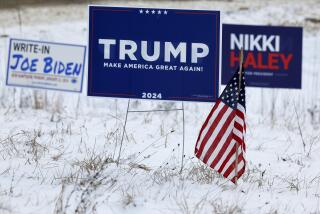Primarily positive
The front-loaded schedule of the 2008 presidential primary season was widely expected to be a disaster. We were among those who argued that holding so many contests so early in the year would give well-funded national candidates an edge and reduce the chances of a truly competitive race in which a lesser-known candidate could prevail over time. We’re pleased to see that it’s not looking so bad after all. Instead of producing an early stampede to the richest and best-known candidates, the primary schedule has mostly done what it was intended to do: allow voters in very different states to have more of a say in deciding the viability of candidates, while still winnowing out the also-rans.
Democrat John Edwards and Republican Rudolph W. Giuliani were sensible to end their campaigns after their poor showings in Florida on Tuesday. Both began with national name recognition, but neither caught fire. Edwards was determined to focus attention on the enduring problem of poverty in America, but his blaming of corporate greed as its primary cause rang false to many voters. Giuliani had the courage to run as a pro-choice, pro-gun-control, tough-on-terrorism Republican, but his temperament was judged unpresidential by many of the moderates he courted.
Their exit has left each party with two supremely well-qualified front-runners. Without the distraction of a huge field, Republican voters going to the polls on Feb. 5 will be able to focus more narrowly on the differences between John McCain and Mitt Romney, while Democrats will be forced to choose between Hillary Rodham Clinton and Barack Obama. As luck would have it, “Super-Duper Tuesday” may not determine the nominee, at least in the tight Democratic race. So the states that vote later, including delegate-rich Louisiana on Feb. 9, may yet have their say.
The Democrats will still have to resolve the question of what to do about the delegates from errant Florida, which held its “beauty contest” primary early against party rules. Many predict that the Democratic National Committee will cave and that Florida’s delegates will eventually be seated at the nominating convention. But to do so would set a dreadful example to flag-jumpers in 2012. Floridians should be required to sit out this year’s convention.
And although the presidential contests are working out well this year, the only long-term solution to the competition among states to hold ever-earlier primaries is a rotating system among regional blocs. We hope we’re wrong again in judging that outcome unlikely.
More to Read
Get the L.A. Times Politics newsletter
Deeply reported insights into legislation, politics and policy from Sacramento, Washington and beyond. In your inbox three times per week.
You may occasionally receive promotional content from the Los Angeles Times.










